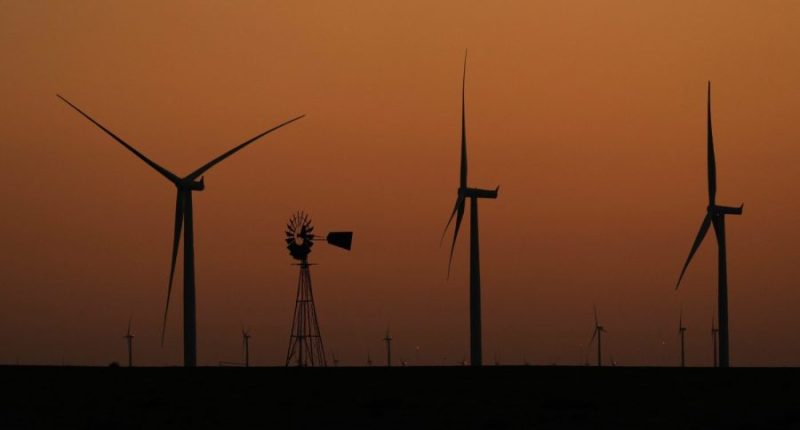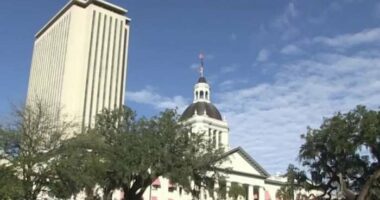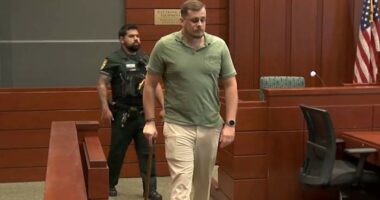Share this @internewscast.com

A brutal and record-early heat wave is baking Texas this week bringing the triple-digit temperatures typical of July to the middle of May.
The sudden heat spike, which was made more likely by the decades-long failure to stop burning fossil fuels, creates an acute danger for a populace not yet acclimatized to summer heat.
It also comes at a fraught time: as the Texas Legislature debates measures that experts say would curtail the very power supply that will keep the air conditioning on and deadly blackouts at bay.
This week, the state House advanced S.B. 715, a bill passed last week by the Senate that would require existing wind and solar plants to provide backup power when they aren’t operating a measure the state business lobby said would lead to blackouts and higher power costs.
Last month, the Senate also passed S.B. 388, a bill requiring that every new watt of wind and solar power also come with a corresponding new watt of coal, nuclear or gas despite a turbine supply chain bottleneck that will make it very difficult to build new gas plants before the 2030s.
The Texas Senate has also passed S.B. 819, which significantly restricts where windmills and solar farms can be built while creating no such restrictions for coal or gas plants.
This push, which the Texas renewables industry calls an existential threat, is happening alongside an effort by the national GOP, which controls Congress and the White House, to slash Biden-era clean energy tax credits and federal efficiency standards that sought to incentivize measures from building out solar production to helping schools cut their heating bills and air conditioning with subsidized geothermal energy.
In addition to increasing power supplies and cutting energy costs, those Biden-era measures had been intended to slow the heating of the planet, which shows itself in not just an across-the-board rise in temperatures but in increasingly bizarre “whiplash” between extremes.
This week’s heat wave, a sudden jump from a mild spring into the teeth of summer, is “one of the more dramatic temperature swings in recent memory,” the National Weather Service reported on Sunday.
For much of Texas, this sudden spike is directly attributable to global warming, according to research from Climate Central, an independent group of scientists that works to untangle the link between extreme weather and the background heating caused by carbon pollution.
Global warming made the sudden heat experienced by three-quarters of the state population about three times more likely and the more intense temperatures experienced by a quarter of the state population about five times more likely, Climate Central said.
Texas’s “extreme and probably unprecedented temperatures” this week began as a ridge of hot air moving in from the Pacific over the mountains of Northern Mexico and West Texas before getting trapped in Central Texas, Austin-based meteorologist Avery Tomasco explained on CBS Monday.
As more and more air rolls downhill and piles on the dry ground, air molecules heat themselves up in a process called compressional heating.
But the root causes of the sudden heat lie deeper: in the state’s protracted drought and a rapidly heating climate phenomena that mean Texans can look forward to a near future of three- to four-month stretches of 100-plus degree days.
In such a world, air conditioning becomes a life-or-death need, which means that grid stability does too.
The health of the Texas grid made national headlines in 2021, when blackouts following Winter Storm Uri killed hundreds. Those blackouts were caused by a combination of failed power generation primarily gas and spiking demand for heating.
The Electric Reliability Council of Texas is predicting that cranked-up air conditioners across the state this week will drive electricity usage to meet or exceed peak levels — just as about a third of the state’s aging gas, coal and nuclear fleet are offline due to breakdown.
Last July, power failures following Hurricane Beryl left millions of Houston residents without air conditioning — which led to surging indoor heat that killed 15 people.
This week, however, such deaths are considered unlikely as the state grid should easily meet electric demand thanks to a years-long buildout in wind and solar power. Solar and battery storage were the biggest single source of new power on the Texas grid last year, the Dallas Federal Reserve found, with gas a distant second.
Texas energy expert Doug Lewin of Stoic Consulting argues that solar, which provides the most power roughly when conditions are hottest, is a “perfect” source for the state.
“There was never a resource more developed to keep Texans cool than solar,” Lewin told The Hill.
The current slate of state legislation, he said, isn’t just an existential threat to renewables but to the entire state economy.
While temperatures will peak and fall back in the 90s later this week, Texas’ long-term forecast is for more heat.
Because water heats slower than air or dry soil, water in the landscape or atmosphere serves as a stabilizing influence against sudden temperature spikes. Moisture in land or air can help keep conditions from getting so hot that the water is baked out of the soil, helping avoid a feedback loop in which the weather gets even hotter and droughts become semi-permanent.
But Texas currently has little such ballast. Last month, Gov. Greg Abbott (R) reupped a drought disaster proclamation that is now three years old.
Despite recent downpours, just under two-thirds of the state is abnormally dry, and more than a third is in severe to exceptional drought, according to the National Drought Information Service.
A 2024 extreme weather report from the Texas state climatologist suggests that as the planet heats, this phenomenon will get worse, as the state faces “increased drought severity, including more erratic runoff into reservoirs.”
The study said that while rainfall totals may sometimes be above average, they will increasingly fall in land-scouring downpours, rather than the slow-soaking that fills reservoirs and aquifers and serves as a buffer against heat.
Recent research suggests that the global area afflicted by lethal heat waves would triple in size in coming decades even if global climate agreements which President Trump exited on his first day in office were kept.
Lewin argued that as climate change makes extreme weather more likely, the chance of unprecedented events “keeps going up,” making the need for a rapidly growing grid more urgent.
“Whatever you thought was the worst heat wave, what you thought was the worst hurricane, what you thought was the worst flood, you know, what you thought was the worst wildfire? There’s a worse one out there,” he said. “It’s just waiting to happen, and we better be ready for it.”









